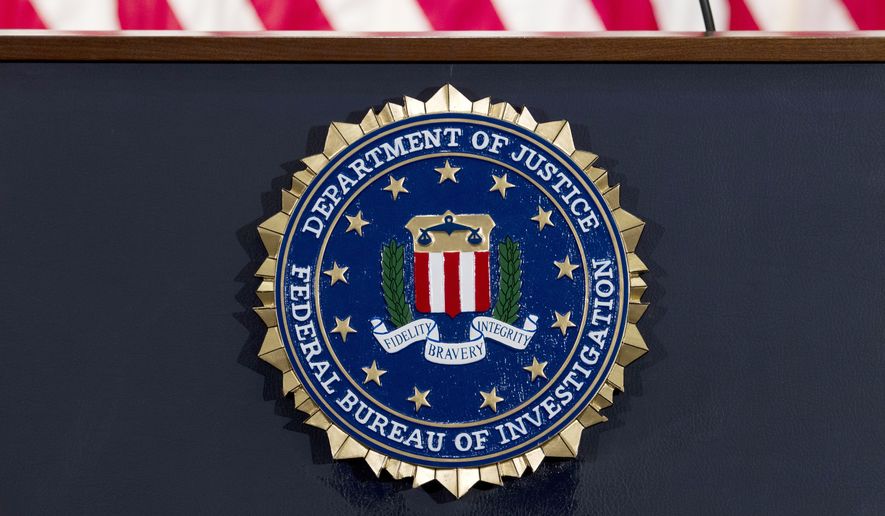The FBI said Thursday that it took steps to stop agents from breaking rules on investigations involving politicians, candidates, religious groups, news media and others — problems that were later revealed by The Washington Times.
Agents violated FBI rules at least 747 times in 18 months while conducting sensitive investigations, according to an internal 2019 FBI audit first reported by The Times.
The FBI said it takes rules compliance seriously, which is why it conducted the audit.
“While the number of deviations from FBI approval, notification, and administrative requirements noted in the report is unacceptable, we began implementing important changes in training and raising awareness even prior to issuance of the report, and we remain committed to ensuring all personnel adhere to our internal investigative and operational guidelines,” the FBI said in a statement.
The FBI did not explain what changes it made to agents’ training nor precisely when the agency implemented the changes. The FBI declined to answer any other questions about the audit’s findings.
Congress members have demanded answers about the FBI’s actions.
The internal review covering Jan. 1, 2018, to June 30, 2019, found agents failing to get approval from senior FBI officials to launch an investigation, agents failing to document a necessary legal review before starting an investigation, and agents failing to tell prosecutors what they were doing, among other things.
FBI auditors recorded a ratio of slightly more than two “compliance errors” per sensitive investigative matter that the auditors examined. Sensitive investigative matters are actions that can affect Americans’ constitutional rights because they involve people engaged in politics, government, news reporting, religious expression and other activities.
The identities of those people are not included in the audit, but a categorical breakdown showed a majority of the cases examined, 191, involved domestic public officials. Dozens more cases involved religious organizations or their prominent members, and dozens of other cases involved political organizations and individuals. Ten cases involved domestic political candidates, and 11 cases involved news media.
Rep. Andy Biggs, Arizona Republican, called for Congress to investigate the FBI’s conduct. He said lawmakers must hold people accountable for enabling problems to occur.
Rep. Jim Banks, Indiana Republican, echoed Mr. Biggs’ call for an investigation and cited concerns that improper investigations may be continuing.
“We know that [President] Biden and [Attorney General] Merrick Garland are putting an enormous amount of political pressure on DOJ officials to target concerned parents and other political enemies of the White House,” Mr. Banks said in a statement. “Reports that the FBI is abusing its power and infringing on the rights of U.S. citizens, especially on the basis of political affiliation and religion, are very alarming and must be thoroughly investigated.”
Rep. Thomas Massie, Kentucky Republican, said the president “should fire any director who tolerates this level of malfeasance.”
The full extent of rule-breaking in the FBI’s work is unknown. Auditors reviewed a small segment of the bureau’s total portfolio. Cato Institute senior fellow Patrick Eddington said he thinks much wrongdoing at the FBI is unexamined. He said he uncovered the 2019 audit in litigation against the FBI for access to government records.
Mr. Eddington said the FBI has failed to produce internal audits from previous years, particularly 2009 to 2012, and it is hard to know what changes the FBI has made without documentation explaining it.
More details about the FBI’s conduct may emerge from the Government Accountability Office’s review of surveillance of individuals and groups through agents’ “assessments.” Rep. Nancy Mace, South Carolina Republican, said GAO committed to conducting a full review in response to a request by her and Rep. Jamie Raskin, Maryland Democrat, who are members of the House oversight committee.
Assessments may lead to investigations and can include surveillance not requiring a court order, the usage and recruitment of human sources, and the examination of publicly available information, among other things, according to the 2008 Attorney General’s Guidelines for Domestic FBI Operations.
Ms. Mace said this week that she expects to receive a GAO report within two months.
Other lawmakers’ recent attempts to get information about the FBI’s domestic operations have not yielded much.
The bureau told Sen. Chuck Grassley of Iowa, the top Republican on the Judiciary Committee, that it did not need to explain its 2016 investigation of the conservative group Concerned Women for America. After conducting an assessment of the group, the FBI revealed last year that there was nothing to pursue.
Such assessments have scrutinized a wide array of groups and people. Mr. Eddington wrote last year that the Cato Institute collected evidence that the FBI had opened assessments of the Muslim Justice League in Massachusetts, a chapter of the League of Women Voters in New York and a Colorado chapter of the International Rescue Committee.
He previously estimated that the FBI made hundreds of thousands of assessments based on data obtained in 2011 by The New York Times, indicating that the FBI conducted more than 82,000 assessments for potential wrongdoing in the previous two years.
• Ryan Lovelace can be reached at rlovelace@washingtontimes.com.




Please read our comment policy before commenting.